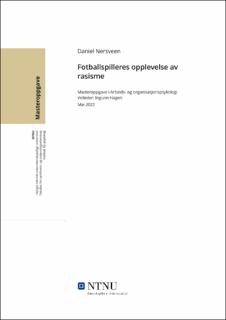Fotballspilleres opplevelse av rasisme
Master thesis
Permanent lenke
https://hdl.handle.net/11250/3007622Utgivelsesdato
2022Metadata
Vis full innførselSamlinger
- Institutt for psykologi [3143]
Sammendrag
Formålet med denne studien er å undersøke hvilke opplevelser fotballspillere har med rasisme og hvordan de føler dette kan gå ut over deres arbeidshverdag. Dette er en kvalitativ studie hvor datainnsamlingen foregikk gjennom semi-strukturerte dybdeintervju av fem profesjonelle fotballspillere. Fotballspillerne har ulike erfaringer både når det gjelder rasisme og i hvilke klubber de har spilt. Tre av informantene har opplevd rasisme og de to resterende har ikke opplevd rasisme, men har observert rasisme. Datamaterialet er analysert ved bruk av tematisk analyse og funnene blir i all hovedsak satt opp mot forskning og teori fra jobbkrav-ressursmodellen (JD-R) og Conservation of Resources-teorien (COR). Dette blir supplert av diverse litteratur om mangfold og rasisme på arbeidsplassen samt arbeidsmiljøloven. Resultatene viser at informantenes opplevelser med rasisme har flerfoldige implikasjoner for arbeidshverdagen deres. For spillerne som ikke har opplevd rasisme går ikke dette nødvendigvis ut over mer enn å delta på kampanjer og lignende, mens det for de som har opplevd rasisme har en vedvarende negativ effekt. Disse negative effektene inkluderer blant annet fall i prestasjon og redusert vel-være. Videre funn er relatert til mangelfull oppfølging og forebygging fra klubbene til informantene. Studien indikerer også at mer burde gjøres fra fotballens styresmakter for å implementere bedre rutiner og strategier for å hamle opp med rasisme i fotball. The purpose of this study is to investigate what experiences football players have with racism and how they feel this may affect their everyday work life. This is a qualitative study where the data is collected through semi-structured in-depth interviews of five professional football players. The football players have differing experiences, both in terms of dealing with racism and in terms of where they have played. Three of the informants have experienced racismfirsthand and the remaining two have not experienced racism themselves, but have observed racist remarks directed at others. The data material is analyzed using thematic analysis and the findings are discussed using theory from the job demands-resources model and Conservation of Resources Theory. This is supplemented by various literature on diversity and racism in the workplace as well as the Working Environment Act. The results show that the informants' experiences of racism have multiple implications for their everyday work life. For the players who have not experienced racism, this experience does not necessarily go beyond more than participating in anti-racism campaigns and the like, while for those who have experienced racism it has lasting negative effects. These include among other negative effects - a reductionin job performance and reduced well-being. Further findings describe inadequacy in working with the players and prevention work in general within the football clubs. According to the study the findings also indicate that more should be done from football's governing bodies to implement better routines and strategies for dealing with racism in football.
